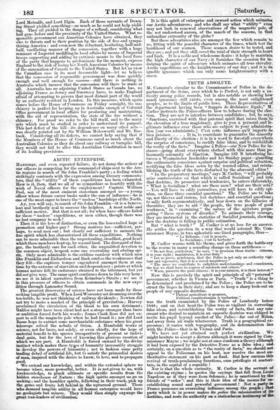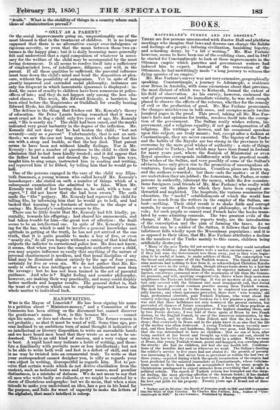TRUTH ABSOLUTE.
CARLLER'S circular to the Commissaries of Police in the de- partment of the Seine, over which he is Prefect, is not only a cu- riosity among police records, but is also notable as showing how much ignorance still exists, even among the most enlightened peoples, as to the limits of public laws. Three Representatives of the department haviiw been " frappes de decheanee regale," M. earlier instructs the Pice-officers how to, behave during the elec- tion. They are not to interfere between candidates ; but, he says, " functions, exercised with that paternal spirit that raises them to the elevation of a true magistracy, give to you a personal and le- gitimate influence over those who are subject to your administra- tion [sur vos administres.] C'est eette influence TIT importe de bien preciser It is, to contribute to guarantee the smeerity and liberty of the election ; it is in 'a word. to forestall everywhere the surprise of conscience, to rectify false ideas, and to reestablish the verity of the facts." Imagine a Policeour New Police for in- stance—going about everywhere clothed. with this more than po- licemanly solemnity of function. Imagine 132 13 interfering be- tween a Westminster freeholder and his Sunday paper—guarding the enthusiastic conscience against surprise and political seduction, rectifying the false ideas sown by the trusted editor, and reesta: blishing the truth of the facts disturbed by the aforesaid. editor!
" In. the preparatory meetings," says M. earlier, " probably
arise controversies on that which is called Socialism"; and into that doctrine, its promoters and tendencies, he enters elaborately. " What is Socialism ? what are these men? what are their acts? —You will have to edify yourselves, you will have to edify opi- nion, on these three essential questions."' The Police are to take up, not thieves and rioters, but doctrines and essential questions'; to sally forth argumentatively, and boar down on the fallacies of theorists; they are to aid " the people, the true people of good workmen," in " examining" the' nature of the agitators propa- gating " these systems of disorder." To animate their courage, they are instructed in the statistics of Socialist journals, showing how the doctrine is falling in public estimation. But " what is truth " bI. earlier is at no loss for an answer. He settles the question in a way that would astound Mr. Com- missioner Mayne, in two -aphoristic one-lined paragraphs, thus- ' la Reforme, c'est is progres. ' Le Socialignie, c'est la barbaric."
M. earlier warms with his theme, and gives forth the battle-cry to the rescue in many a sounding change on these antitheses-
" Do not fear, gentlemen," he says, " to proclaim these truths : citizens, it is your right ; Magistrates, it is your duty." " Let us prove, gentlemen, that the Police is not only an authority vigi- lant and repressive, that it is a moral magistracy."
" The more we contribute to enlighten understandings and consciences, the less we shall have to repress of misdeeds and crimes." " Warn, preserve the good citizens :• it is your mission, it is their interest?'
Now this is precisely the spirit and principle of all " paternal" government, whether in Vienna or Paris. " Truth" is a thing to be determined and proclaimed by the Police ; the Police are to in- struct the lieges in their duty, and are to keep a sharp look-out on people of any opposite doctrine.
" Patient agriculture is progress, Political constitutionism is barbarism."
was the truth enunciated by the Police of Lombardy before 1848 ; and on that head the Police was so vigilant in correcting false ideas, and reestablishing the verity of facts, that any mis- creant who desired to maintain an opposite doctrine was obliged to invite his pupil beyond earshot of the Police—far out of Milan, and away from all walls whatsoever. Truth is a geographical ex- pression; it varies with topography, and its determination lies with the Police—that is in Vienna and Paris.
We have not yet attained such perfect civilization. We might hesitate to accept a dictum although it were signed by Com- missioner Mayne ; we might not at once condemn a theory although it had been exposed by the Detective Force as a false idea ; and certainly, on a question as to " the verity of facts," we should not appeal to the Policeman on his beat, nor receive the most au- thoritative statement on his part as final. But how curious this revival of truth-proclaiming functions, emu privilegio et auctori- tate, in the capital of a republic !
Nor is that the whole curiosity. M. earlier is the servant of the existing regime ; he quotes the sayings that fall from Louis Napoleon as if they were from Solomon ; he is sanctioned by the friends of " order ": and this is their idea of the means for re- establishing sound and powerful government ! Not a
in France possesses an overruling influence among the peep ; that party which is in power makes its police the missionaries of its doctrine, and rests its authority on a stationhouse testimony of the.
" truth." What is the stability of things in a country where such ideas of administration prevail P



























 Previous page
Previous page